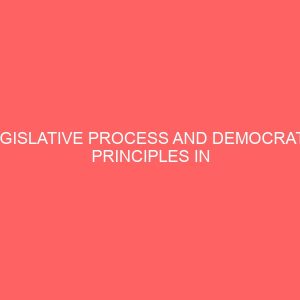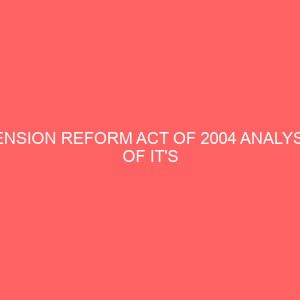Description
ABSTRACT
The thematic thrust of the emergent research is on the presentation of systematic and comprehensive critical analysis of the legislative process and democratic principles in Nigeria politics. Critical appraisal of the legislature an important organ of government in democratic process in Nigeria is vital for the upliftment of political and socio-economic development of Nigeria. Beside the role of law-making which is traditionally associated with the legislature from antiquity, it is also an instrument for representative government. With the return of democratic rule in Nigeria in may 1999, many have hoped that the dividends of democracy would manifest in Nigeria, albeit the legislative chamber in Nigeria. However, this has remained an illusion as nearly ten years of democratic rule in the country has failed to change the fortune of the masses. It is rather disappointing, negligence and highly unfortunate of the legislative arm of government in Nigeria. This has necessitated this study to provide empirical factors that has made the Nigeria legislative arm ineffective in changing the lots of the masses and in providing for quality representation. Therefore, this research work has examined the democratic process in Nigeria with emphasis on the legislature from 1999 – 2006 even till date. The work examined the performance of this arm of government, the factors that have affected it and some of the achievements of the legislature during this period.
TABLE OF CONTENTS
Title page – – – – – – – – – i
Certification – – – – – – – – ii
Dedication – – – – – – – – iii
Acknowledgement – – – – – – – iv
Abstract – – – – – – – – – vi
Table of contents – – – – – – – vii
CHAPTER ONE
Introduction – – – – – – – – 1
1.1 Statement of Problem – – – – – 1
1.2 Objective of the Study – – – – – 3
1.3 Significance of Study – – – – – 3
1.4 Literature Review – – – – – – 4
1.5 Theoretical Framework – – – – – 20
1.6 Hypothesis – – – – – – – 24
1.7 Method of Data Collection – – – – 24
References – – – – – – – 25
CHAPTER TWO
The Nigerian Legislature – – – – – 27
2.1 History of the Nigerian Legislature – – – 27
2.2 Overview of the Nigerian Legislature Process – 35
2.3 Assessment of the Nigerian Legislature – – 37
CHAPTER THREE
Problems of the Legislature in Nigeria – – – 42
3.1 Executive Interference/Lack of Autonomy – 42
3.2 Corruption – – – – – – – 44
3.3 Excessive political Brinkmanship – – – 45
3.4 Heightened Ethnic and Regional Identities – 47
CHAPTER FOUR
Some Achievement of the Legislature – – – 49
4.1 Freedom of information Bill – – – – 49
4.2 The Pension Reform Act 2004 – – – – 52
4.3 Anti-Terrorism, Economic and Financial Crime and
Allied Matters.- – – – – – – 56
4.4 The New Electoral Act and the Struggle for Space
control of Political space – – – – – 58
CHAPTER FIVE
Summary, Conclusion and Recommendation – 60
5.1 Summary and Conclusion – – – – 60
5.2 Recommendation – – – – – – 63
Bibliography – – – – – – – 70
CHAPTER ONE
INTRODUCTION
1.1 STATEMENT OF THE PROBLEM
The legislature is an important arm of government in the democratic process empowered to make, change, or repeal its laws and to levy and regulate its taxes. Beside the role of law making, which is traditionally associated with the legislature from antiquity, it is also an instrument for representative government. It is therefore not debatable that the modern legislatures are the engine of democracy in our contemporary world today.
With the return of democratic rule in Nigeria in May 1999, many had hoped that the dividends, which democracy confers on the society would manifest in Nigeria, albeit the legislative chamber in Nigeria. However, this has remained an illusion for the past eight years of democratic rule in a country which failed to change the fortunes of the masses.
Regardless of the central position of the legislature in our democratic process; especially in this current democratic era, no empirical studies have been conducted to examine the Nigerian legislature with a view of providing an empirical account for its effectiveness. Rather studies have concentrated on the executive and the electoral process, ignoring the legislature.
It is rather unfortunate, neglect of the legislative arm of government in Nigeria has necessitated this study to provide empirical factors that have made the Nigerian legislature ineffective in changing the lost of the masses and in providing for quality representation.
To achieve this aim, the following questions have been designed to guide the research work:
(1) To what extent has the Nigerian legislature performed its role in the democratic process in the country?
(2) Are there factors that account for the ineffectiveness of the Nigerian legislature?
(3) What is the achievement of the Nigerian legislature since the return of democracy in 1999?







